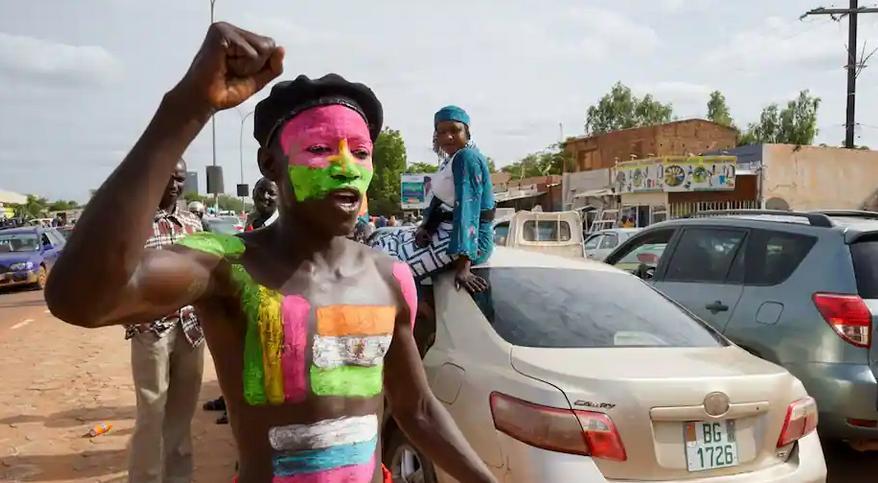
Despite sanctions, Niger junta clings to power
The future of the West-African country of Niger hangs in the balance as the newly formed military junta refuses to give up power despite being hit with more sanctions.
The new sanctions were imposed by the Nigerian President Bola Tinubu through Nigeria’s central bank, hours after the new military leaders denied a joint delegation from West African states, the African Union and the United Nations permission to enter Niger.
The mission was aimed at restoring constitutional order after last month’s military coup saw the country’s democratically-elected president Mohamed Bazoum ousted and former presidential guard head Abdourahamane Tchiani installed as head of state.
The Economic Community of West African States, or ECOWAS, told coup leaders to stand down last week threatening a possible military intervention.
However, a spokesman for the Nigerian president, who is also the chair of ECOWAS, says the group will not send in a military force and prefers a diplomatic solution.
‘’Diplomacy is the best way forward. He and representing the consensus position of the ECOWAS heads of states, he has communicated clearly that he along with his colleagues in the bloc would prefer a resolution that was obtained through diplomatic means, through peaceful means, rather than any other.”
The coup leaders, who call themselves the National Council for Safeguarding the Homeland, blamed rising insecurity and a lack of economic growth in Niger for the military takeover.
The military governments of neighbouring countries Burkina Faso and Mali have stood in solidarity with the junta, saying any external military aggression in Niger would be considered an act of war against them.
Both countries have each undergone two coups since 2020, as their militaries claimed they could do a better job of fighting increasing Islamist violence in the region linked to al-Qaeda and I-S.
A resident of Niger’s capital Niamey says he believes the collaboration of the three juntas could offer more security for Nigeriens and ECOWAS needs to listen to the concerns of the people.
“I think that the Malian and Burkinabe soldiers who came to Niger wanted to give a strong sign of their solidarity. And beyond that, I think it will help us fight terrorism more effectively, and pool our forces. I also think that ECOWAS should give priority to dialogue to try to get out of this crisis and understand what the people of Niger want, their aspirations.”
The coup is also risking military support from Western nations that were working with Niger against West African extremists.
The United States has paused some forms of aid in the areas of international military education and training, peacekeeping operations and foreign military financing programs.
The U-S was set to provide Niger with A$356,326,900 in aid in 2023.
Despite resistance from the junta to negotiate, Matthew Miller from the U-S State Department, says there is still hope for a return to constitutional order.
“We are still hopeful and we are still trying to achieve a result that is a return to the constitutional order, we hope we don’t have to get to to the point where we need to make that determination, because our hope is to see the constitutional order restored. We don’t believe that window is closed at this point, but it’s a very dynamic situation.”
Speaking to the BBC, U-S Secretary of State Antony Blinken also warns that this instability has opened the doors for the Russian Wagner mercenary group who have offered their forces to the junta.
He says the U-S is concerned as Wagner involvement in neighbouring countries such as Mali have left a trail of human rights abuses and exploitation.
“For sure we have concerns when we have something like the Wagner group possibly manifesting itself in different parts of the Sahel. And here’s why we’re concerned: because every single place that the Wagner group has gone, death, destruction and exploitation have followed. Insecurity has gone up, not down. It hasn’t been a response to the needs of the countries in question for greater security.”
Meanwhile, the humanitarian needs of the people of Niger are growing amidst the new economic sanctions and ongoing uncertainty.
Niger which is a former French colony, is one of the poorest countries in the word and is also frequently affected by extended droughts common to the Sahel region of Africa.
U-N Resident and Humanitarian Coordinator in Niger, Louise Aubin, says the already-struggling country is now seeing a significant depletion in vital resources.
“So, more than the 4.3 million people we had planned on supporting through emergency humanitarian assistance, we might see that number growing and growing fast. The risk is that we start running out of assistance materials to be able to help out people. I’m talking about simple things that are so life saving, I’m talking about vaccines, I’m talking about food.”
Source: sbs





